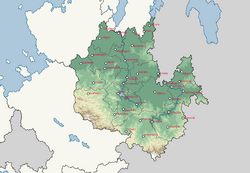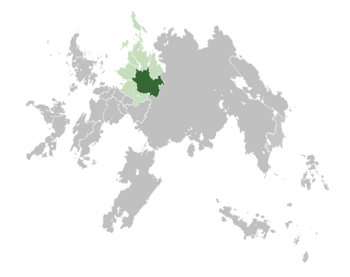Krumlau
Federation of Krumlau Krumlawische Föderation / Крумловская Федерация | |
|---|---|
| Motto: Tod vor Schande Death before dishonor | |
 Map of Krumlau | |
 Krumlau in green, Erdara in light green | |
| Capital and largest city | Rakonitz |
| Official languages | Hesurian, Wenish |
| Demonym(s) | Krumlavian |
| Government | Federal parliamentary monarchy |
• Monarch | Louise von Thalmark |
• Chancellor | Natalia Wojtek |
| Reichstag | |
| Bundesrat | |
| Area | |
• | 1,004,344.2 km2 (387,779.5 sq mi) |
| Population | |
• 2015 census | |
• Density | 44/km2 (114.0/sq mi) |
| GDP (PPP) | 2018 estimate |
• Total | |
• Per capita | |
| GDP (nominal) | 2018 estimate |
• Total | |
• Per capita | |
| Gini (2015) | medium |
| HDI (2015) | very high |
| Currency | Krone (KRN) |
| Date format | dd.mm.yyyy |
| Driving side | right |
| ISO 3166 code | KR |
| Internet TLD | .kr |
The Federation of Krumlau, also known as Krumlov, is a country in southern Erdara bordered by Mascylla, Hytekia in the north, and Dulebia to the southwest. Krumlau is a landlocked country covering an area of 1,004,344 square kilometers, making it the largest nation in Erdara. It is a Federal parliamentary monarchy consisting of 15 highly autonomous constituent states and three free cities. The organization of the nation is complex and structured on regional and linguistic grounds, given the country's billingual nature. It's largest city and capital is Rakonitz, with 3.8 million residents. Other major cities include Vladika, Nordgau, Ihlenburg, Rühen, Kandau and Waasenfurt. Krumlau is both the largest and most populous state in Erdara, as well as being one of the least densely inhabited.
Krumlau is home to two major ethnic groups, a Hesurian community, which comprises of 41% of the population, and a Pomric Wenish community, which form the majority of the populace with 47% of Krumlau identifying as Wenish. Additionally, certain regions of Krumlau are inhabited by Kuns, consisting of 6% of the population. Despite lacking majority, the Hesurian language is considered the Lingua Franca in the nation, although both the Standard Hesurian dialect and Wenish are taught at schools. The two free cities, Rakonitz and Vladika, are officially billingual, although Hesurian is the dominant language in the Capital, while in Vladika Wenish is dominant.
The Krumlavian state's formation begins in the 10th century, with the creation of the Order of the Haemator Knights of the Cathartic Temple, an order mainly composed of Hesurian followers of Ditanery with the goal of converting the Pomric peoples south of Erdara. Sponsored by the Ragucin Empire, the order, together with Hesurian local nobles, made significant gains in conquering northern Pomric pagan area. The Margraviate of Krumlau was founded in 1019, as a vassal to the Ragucin Emperor. Several of the conquered lands were also granted to the Haemator Order, who undertook significant conversion efforts of the local Pomric folk. The Margraviate grew in influence and size, receiving major imperial support during invasions from eastern hordes. As the Ragucin Empire splintered in the late 15th century, the surroundings of the Margraviate and the now decadent Haemator Knights banded in a loose confederation, creating the Kingdom of Krumlau. In the 19th century the unstable order of this Kingdom reached its peak in the Krumlavian Revolution, which would eventually cause the undertaking of significant reforms and a new constitution which would be the foundation of Krumlau's modern state. The nation grew as an industrial powerhouse and has since then emerged in Erdaran affairs.
The aftermath of the Revolution was defined by increasing animosity between the Hesurian and Wenish peoples, with significant separatist movements present during the second half of the 19th century. The economic differences between the industrializing, Hesurian north of the nation and the more rural Wenish south created a sour political environment, which shaped the political organization of the country to this day. It was only during the Continental War and posteriorly at the (Maybe a Krumlavian-Dulebian war?) that a true shared Krumlavian identity was created. Despite this, separatism and regionalist politics have remained, albeit at a weaker state.
Krumlau is one of the founding states of the Erdaran Union and the Assembly of Nations, partaking in various multilateral efforts particularly when it comes to the further economic and political integration of Erdara.
Krumlau is a highly developed nation, with an advanced high-income economy. It has very high standards of living, quality of life, education and healthcare, yet regional disparities in development are still noticeable.
History
Early History
Winyan Tribes
Ragucin Crusade
Kingdom of Krumlau
Krumlavian Revolution
Recent History
Geography
Climate
Biodiversity
Urbanisation
Politics
Government
The Federation of Krumlau is a Federal parliamentary state under a constitutional monarchy. The monarch is Head of State and commander in chief of the armed forces, still holding some executive power. The position of Chancellor, Krumlau's head of government, belongs to the elected politician most likely to command a Coalition in parliament. The Chancellor chooses ministers which are formally appointed and taken from office by the monarch. While seldom used, the monarch may make use of these powers to remove a Minister from office, an event done only after major political scandals. The Monarch is also responsible for calling federal elections.
The Monarchy in Krumlau is considered by the constitution a moderating political figure, and thus focused in affairs of state and mediating the balance between the country's legislative, executive and judiciary. The Monarch is bound to uphold constitutional rights of the country's citizens and be a neutral figure between governments. Krumlau is an elective monarchy, with special elections taking place at the times of a monarch's death. Registered voters of each constituent state or free city will vote for three electors from their state's nobility to represent their constituency in the Reichstag, with the exception of Free Cities, where any citizen of age may be a candidate. The term of an elector lasts until the death or deposition of the monarch, which the Reichstag may do with a qualified majority. The Reichstag meets yearly during a monarch's reign, to discuss and counsel the reigning monarch in affairs of state. In these yearly sessions the Reichstag may enact a motion of no confidence, and with a two thirds majority depose the ruler.
Other than particular monarch related affairs, the federal legislation is responsibility of the Bundesrat. The Bundesrat represents each of the constituent states and free cities, with their ammount of seats proportional to the population. Deputies are elected for 4 year terms, with elections for deputies within each state being specified by their associated state or free city's constitution. Most states are elected by proportional representation. The Bundesrat has the power to dismiss the government, and thus the majority in the Bundesrat determines the choice of Chancellor. In modern times, the Social Democratic Party of Krumlau, the Liberal Democratic Party and the regionalist Krumlavian National Party and Krumlavian Agrarian Movement have been the major parties, with more recently the Green Party having achieved significant victories in major constituencies.
Law
Constituent States
| Coat of Arms | State | Head of government | Bundesrat votes | Area (km2) | Population | HDI | class="unsortable" Capital | GDP per Capita | class="unsortable" Demographics |
|---|---|---|---|---|---|---|---|---|---|
| Rakonitz | Elise Vogel (Grüne) |
30 | TBD | 2,192,534 | 0.953 | – | 69,886 | 48% Hesurian 40% Wenish 12% Other | |
| Vladika | Alena Igoshina (КСДП/KSP) |
26 | TBD | 1,876,813 | 0.934 | – | 64,403 | 64% Wenish 22% Hesurian 14% Other | |
| Venya Wenland |
Albert Sokalov (КНП) |
TBD | TBD | 3,413,920 | TBD | Kaplava Kaplawa |
TBD | TBD | |
| Westmark Zapadnyy Krai |
Otto Wolf (KB) |
TBD | TBD | TBD | TBD | Eisenburg Zheleznyygrad |
TBD | TBD | |
| Waagland Vahskiy Krai |
Kiril Werner (KSP/КСДП) |
TBD | TBD | 2,720,342 | TBD | Rawen Rjava |
TBD | TBD | |
| Brunnen Brna |
Ulrike Newa (HB) |
TBD | TBD | 2,487,282 | TBD | Rühen Ruhno |
TBD | TBD | |
| Ostrovets Ostrowitt |
Vasily Myakotin (КНП) |
TBD | TBD | 2,263,676 | TBD | Vulkov Wulkow |
TBD | TBD | |
| Saale-Helmark Solava |
Hans Olsen (LDP / ЛДП) |
TBD | TBD | 2,147,483 | TBD | Aahof Dvora |
TBD | TBD | |
| Ihlenburg Ilenograd |
Catherine Mauer (KSP/КСДП) |
19 | TBD | 1,433,529 | 0.961 | – | 75,886 | 71% Hesurian 16% Wenish 13% Other | |
| Arkona Arken |
Natalia Klein (КНП) |
TBD | TBD | 1,382,721 | TBD | Radovlitsa Radmannsdorf |
TBD | TBD | |
| Kurgan Kurland |
Jan Hunyadi (КНП) |
TBD | TBD | TBD | TBD | Vieloniy Welonen |
TBD | TBD | |
| Walden Lesa |
Hermann Thauring (LDP / ЛДП) |
TBD | TBD | TBD | TBD | Göllnitz Gelnitsa |
TBD | TBD | |
| Wolvege Volvega |
Alexander von der Leyen (KB) |
TBD | TBD | TBD | TBD | Kandau Kandov |
TBD | TBD | |
| Adelnau-Wollstein Odolanov-Woltsin |
Tania Krüger (LDP / ЛДП) |
63 | TBD | 4,587,702 | 0.927 | Born Bor |
54,385 | TBD | |
| Kameland Kamenya |
Günther Bölcke (KSP/КСДП) |
TBD | TBD | TBD | TBD | Waasenfurt Vasebrod |
TBD | TBD | |

|
Aitau | Ferdinand Waldmann (KSP/КСДП) |
43 | TBD | 3,158,505 | 0.913 | Nordgau | 49,269 | TBD |
| Falk Falak |
Victor Ziegler (KB) |
TBD | TBD | TBD | TBD | Grimmen Grima |
TBD | TBD | |
| Kiewern | Anna Ulrich (KSP/КСДП) |
TBD | TBD | TBD | TBD | Tewel | TBD | TBD |
